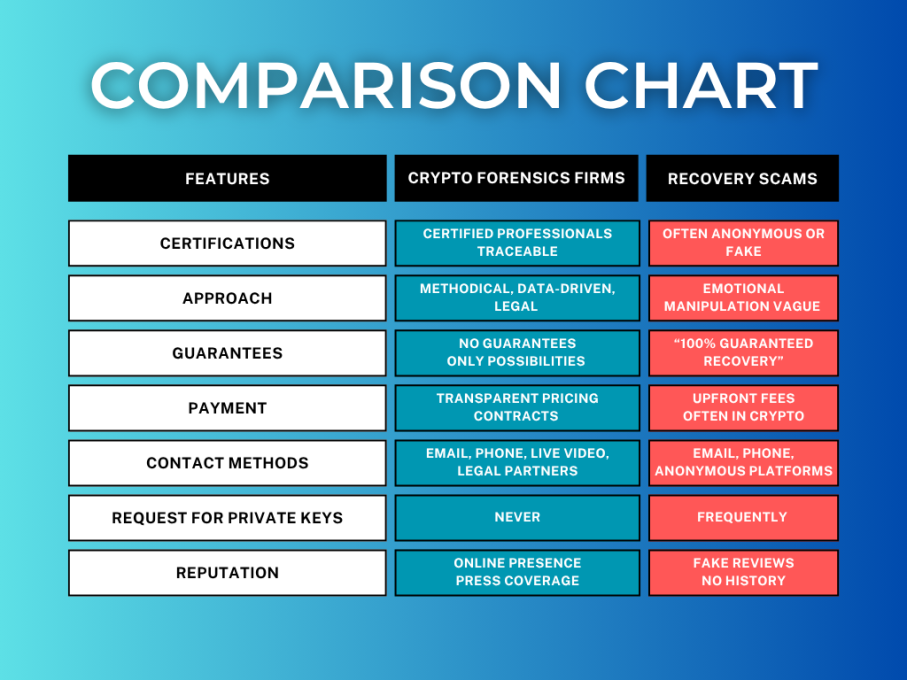In today’s rapidly growing digital asset world, losing access to your crypto, whether due to hacking, phishing, or fraud, can be financially devastating. In response, a growing number of crypto forensics firms have emerged, offering professional services to trace and potentially assist in the recovery of lost digital assets. However, this surge has also attracted bad actors in the form of recovery scams, preying on victims who are desperate for professional help.
Understanding the differences between legitimate crypto forensics services and scams is crucial. Here’s a detailed breakdown to help you tell the difference and protect yourself.
What Are Crypto Forensics Firms?
Crypto forensics firms specialize in tracking and analyzing blockchain transactions. Their goal is to identify where stolen or lost funds have gone, often working with law enforcement or legal teams to support recovery efforts.
Key Characteristics:
- Professional credentials: Staffed by certified analysts, cybersecurity experts, and legal professionals
- Transparent processes: Explain their methodology clearly—usually involving blockchain analysis tools like Chainalysis or Elliptic.
- No promises of guaranteed recovery: Legitimate firms make it clear that recovery is not guaranteed and depends on the circumstances.
- Often work with authorities: May collaborate with law enforcement, lawyers, or government agencies.
- Require contracts and documentation: You’ll typically sign a formal agreement outlining the scope of work and fees.
- Charge upfront fees or hourly rates: Legitimate services are not cheap, but they're transparent about pricing structures and billing.
What Are Crypto Recovery Scams?
Crypto recovery scams pose as forensics firms or independent recovery “agents.” They promise to recover your lost or stolen cryptocurrency—usually with little to no effort on your part—and request upfront fees, personal information, or private keys.
Red Flags:
- Guaranteed results: Claiming they can “definitely” recover your funds is a major red flag.
- High-pressure tactics: Urgency and emotional manipulation are common tactics.
- No verifiable credentials: Often use stock photos, fake names, or stolen identities to build credibility.
- Ask for crypto or private keys: No legitimate recovery service will ever ask for your wallet’s private key.
- Anonymous or unverifiable contacts: Operate primarily over WhatsApp, Telegram, or email with no traceable physical location.
- Lack of online presence: Few (if any) legitimate reviews, no case studies, or fake testimonials.
How to Protect Yourself
- Do your research: Look up the firm’s name, team, and track record.
- Check for real reviews: Use third-party review platforms and forums like Reddit or Trustpilot.
- Avoid anyone asking for upfront crypto: This is a hallmark of a scam.
- Consult legal professionals: Especially if large amounts of money are involved.
- Report scams: File reports with your local cybercrime unit, the FBI (in the U.S.), or other relevant authorities.
Conclusion
The crypto landscape is still evolving, and with it, so are both the solutions and the scams. While crypto forensics firms can offer valuable services in investigating fraud and tracing assets, recovery scams exploit victims’ hopes with false promises and often lead to more loss.
By learning the signs, asking the right questions, and staying cautious, you can avoid the traps and, if possible, work toward real solutions for crypto asset recovery.


